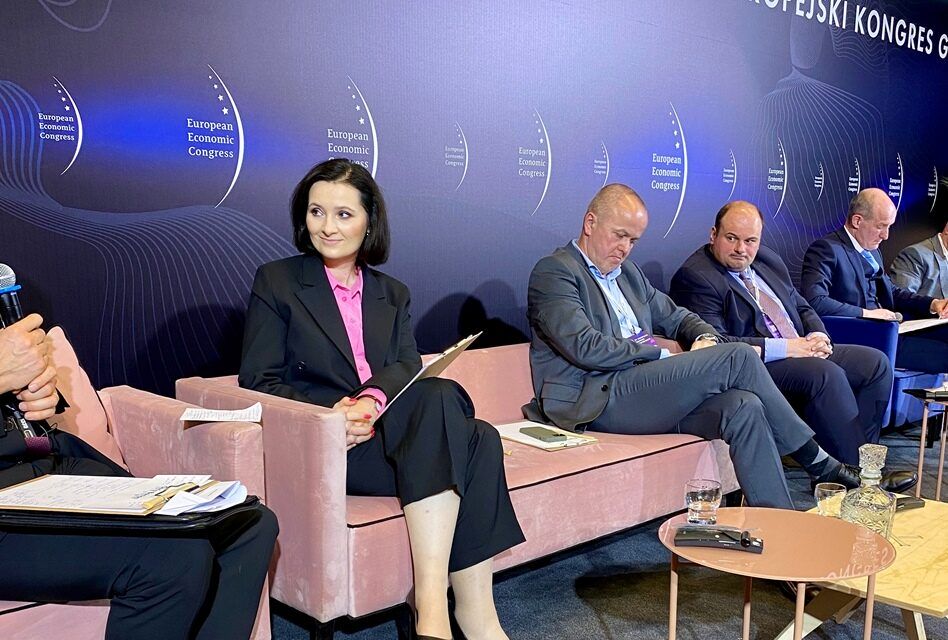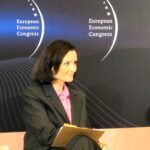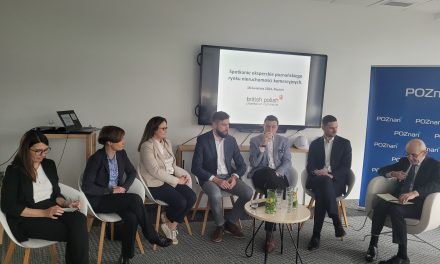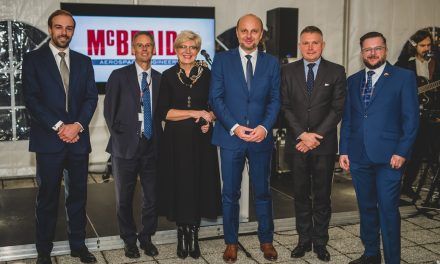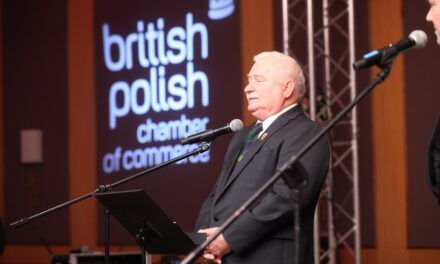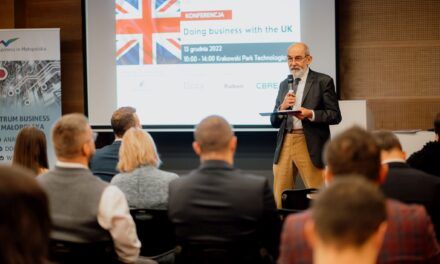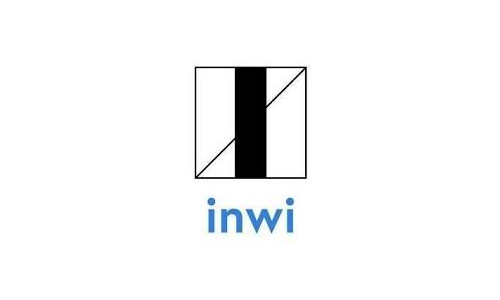Polish and British opportunities – business and government share experiences
It has been over two years since the UK left the EU’s single market and the Customs Union, nevertheless, the UK and Poland remain important trading partners. Last year the value of trade in goods and services reached an all-time high of over £25 billion.
A panel on the first day of the 15th European Economic Congress in Katowice brought together senior representatives of government and the private sector to talk about current economic cooperation between Poland and the UK. The panelists looked at trade and investor relations under the UK-EU Trade and Cooperation Agreement, and potential future trade cooperation between the two economies.
The speakers were Chris Barton, HM commissioner for trade with Europe; Aneta Jóźwicka, BPCC chairwoman and director of corporate relations for Northern Europe at Diageo; Piotr Kozłowski, vice-president consulting, Loyalty Solutions, Comarch; Bogdan Kucharski, head of country for Poland, bpEurope; Nick Lakin, director of corporate affairs, Kingfisher Group (Castorama in Poland); Grzegorz Oszast, member of the management board, Polish Investment and Trade Agency (PAIH); Andrzej Pośniak, managing partner, international law firm CMS; and James Young, director of strategy and compliance at JDR Cable Systems (a part of the TFKable Group). The session was moderated by James Pomeroy, HSBC’s global economist.
Chris Barton described Poland as a shining example of economic openness in terms of transformation. He provided sound reasons for optimism – a 26% increase in trade and investment between Poland and the UK year on year. He described the UK-EU Trade and Cooperation Agreement (TCA) as a world-class free-trade agreement, better than any trade deal the EU has with any other third party, though obviously not as good as being in the single market when it comes to movement of goods. “The TCA is a strong basis for a vibrant trade relationship and for Polish investment into the UK – in particular in Britain’s tech sector, which at $1 trillion is the third largest in the world. Polish companies are welcome – in particular the low-carbon sector – offshore, nuclear, carbon capture & storage, life-sciences and defence,” he said.
Grzegorz Oszast began by saying that Brexit and Russia’s full-scale invasion of Ukraine have had an initial negative effect on Polish-UK trade, but have also created new opportunities. The war in Ukraine has brought the UK and Poland closer together, as both are strong supporters of Ukraine.
Aneta Jóźwicka spoke about the role of the BPCC with its 260 members, both international corporates and smaller companies, and its 30 years of supporting business “in conversation with legislators to improve the regulatory environment.” Brexit, she said, “is now something in history – businesses had started to prepare for it well in advance – and how many people had to work ahead to prepare for the customs changes – it was pretty painful”. The situation today is “business as usual for bigger companies with multiple departments, but we must remember the problems still faced by smaller companies and individual countries’ differing interpretations of the customs regulations of the TCA.” There is a risk stemming from Ukraine war, but it is also an opportunity for Poland, she said. “Finally Poland is focusing on defence and security. The defence sector has been preaching to the Polish government for 20 years about this danger.” Ms Jóźwicka spoke favourably about the development of a modern, open civic society that she witnessed blossoming in Poland; “inviting Ukrainian refugees to our homes, we formed a real society and behaved in a responsible manner – it took this tragic situation to make us concentrate on social issues and not only economic growth,” she said.
James Young recounted the history of how JDR Cables was acquired by TF Kable Group in 2017 after ten years of collaboration between the two companies in the energy supply-chain. He mentioned Brexit’s impact in the early days, which impacted deliveries due to issues at the border, but he sees the future as bright, driven by green-energy transformation, where the global economy will need more cables and greater energy security.
Andrzej Pośniak spoke of CMS’s 25 years in Poland and its continued growth as a law firm here. From the business perspective, the firm is highly dependent on the British market. The reason behind this is not only that there are direct investments from the UK into the Polish market, but mainly because the decision-makers and investment centres are in London. When we have a downturn in the British market, it spreads to the Polish market and affects investments from other countries, because the decision-making centres are in London. He said: “In terms of Brexit, besides generating more work for lawyers, I don’t think it has somehow had a very negative impact on the economy, on trade or the functioning of many companies. There are, of course, many such figures that will prove some declines here and there, but these are declines of 1-2 percentage points. Another issue is how we benefit from Brexit. Historically as a developing country, Poland had needed support from western European countries and from the UK. Now, after Brexit and the pandemic, the UK is more in need than it used to be and thus has begun to actively seek opportunities to cooperate with countries like Poland. And this is the moment when we should, as investors here in Poland, take advantage of it to build strong new relationships. There is an increasing amount of Polish investments in the UK – many Poles also remain there, and we will have that much more in common; the war in Ukraine is another important factor why we should benefit from a closer relationship.” he said.
Nick Lakin introduced the Kingfisher Group and its Castorama home-improvement stores in Poland; present on the market for over 25 years, the largest UK employer in Poland with over 13,000 employees, opening its 100th store this year – one of seven store openings this year, with plans for up to another 80 over next five years. Mr Lakin described Kingfisher as “great fans of the Polish-UK relationship”, pointing to the group’s sourcing relationships with some of Poland’s excellent manufacturers. Polish-made kitchen cabinets are exported to the group’s stores across France, UK and Spain as well as Poland. He said covid, Brexit, and the Ukraine war have all been challenges, however. As well as sourcing, the group conducts IT and back-office operations in Poland. When it comes to the net-zero agenda, Nick said: “half of all our Polish stores already have photovoltaic panels on roofs. We help our customers save energy, water and money in their homes; and, we’re working to share this expertise across Europe,” he said.
Comarch, one of Poland’s largest IT firms, is a major exporter of software to UK; Piotr Kozłowski offered his perspective of selling to the UK as a Polish business: “Once we saw the UK as part of the domestic market, now we have to see it as a foreign market. However, the UK remains an aspirational market for us, the most developed consumer of IT services.” Mr Kozłowski’s division makes the software behind consumer loyalty schemes such as Avios for BA, Fuelled for BP, Costa Coffee and Sky TV. “We are a Polish brand, we have Polish IPR, and we have seen for the last decade the opportunity in the UK consumer market.” Loyalty programmes there still depended on coupons sent by post – “the UK consumer market required huge transformation that called for innovative solutions,” he said. “New ways are needed for brands to reach customers as shopping malls are being shut down; there’s a huge transformation of consumer market going on, in the US, UK and EU.”
Bogdan Kucharski said that bp has been present in Poland for 32 years, with almost 600 filling stations, the Wild Bean Café chain, Castrol oils, the aviation-fuel business and now the move to electrification. “Brexit has had no impact on our retail business because the supply chain is local or regional, and support from HQ keeps flowing. But on the other side, we now face new barriers for our future development – energy transition – the offshore wind agenda – which calls for massive investment and experience; the supply chains don’t exist in Poland. Polish regulations specify that suppliers must have Polish or EU experience. We would like to see liberal, free access to the market. The more competitors there are, the better it is for the Polish economy. Clean energy is a long-term project, its needed for Poland to be competitive in the future – Brexit’s had a negative impact, but the goodwill is there,” he said.
The next round of questions focused on the opportunities and challenges for investing in Poland.
Nick Lakin described Poland as an ongoing growth opportunity, with healthy competition and a level-playing field. “The consumer wins when there’s the best offer. Favouring any one firm over another is bad for consumers. Where government’s can always help is consistency of regulation – thus also managing international investors’ expectations in the medium term. The green transition is also absolutely crucial. The scale of the investment that’s needed presents a challenge – major changes, especially with vehicles and homes, are the next stage. And retail is also constantly changing – habits are changing – consumers are using their phones to shop – it’s exciting and good for consumers.”
Bogdan Kucharski said that it will still take a decade or two for Poland to catch up with the UK: “in terms of infrastructure investment, our road network has expanded – motorways are up from 700km twenty years ago to 5,000km today, with another 4,000km under construction or planning. But all this will need to be low-carbon. Grid infrastructure is needed at scale – cables, transformers, storage, offshore wind, this creates great investment opportunities. And for Ukraine – the Polish economy plays a massive role in military and non-military investment. Poland is the only gateway of scale into Ukraine – materials, energy and services are already being delivered from Poland, and this will go forwards.”
Andrzej Pośniak addressed the pros and the cons starting from indicating great opportunities that Poland has in comparison to other markets when it comes to infrastructure investments. The pros, he said, were that the negative impact on other countries in CEE was stronger than on Poland, and in terms of both real estate and long-term investments, the market here is wider and deeper than our neighbors’ markets. Poland’s size and location also help. However, the downside – the cons – were the lack of legal and tax stability and predictability. He said: “We have plenty of lawyers in Poland, but we’d rather have a stable and growing economy than have to deal with mountains of new legislation. Overall, however, the benefit, the surplus, of investing in Poland is higher than the risk. A lack of stability is included in the price. With greater regulatory predictability, investment will grow and the investment dynamics will be positive. Poland has seen hundreds of changes to tax law in the last two years alone, and their effects are still to be assessed. However, businesses that take those risks into consideration, even as they cause some losses, will still benefit because those losses may still be less than the potential benefits.”
Aneta Jóźwicka mentioned the BPCC’s research which compared the major barriers faced by British investors in Poland with the situation two years ago; 57% said it is more difficult now than it was then; 77% said the constantly-changing tax system had got worse, contract enforcement was seen as worse than it was by 75% of respondents; recruitment and retention by 72%, inflation by 82%, and access to energy was cited as being worse by 75%. “Our members hope for a more predictable regulatory system – one month to implement changes is not enough!” she said. Stability would help: “we need to share what’s working and what isn’t from the regulatory perspective – we need to advise our political decision-makers as to what’s good for the state and the economy. Poland is a hub of great talent. More and more Poles are winning in the international talent market, we have a fantastic workforce, not only blue collars but professionals supporting complex business operations.”
James Young mentioned the new high-voltage cable currently being built by TFKable and JDR Cables in the UK and the new Bydgoszcz high-voltage R&D centre. “The UK leads the world in growth in offshore wind; currently, it has 15GW of installed capacity, but the government wants to increase that to 40GW of offshore wind; this creates an enormous market for connecting the turbines and upgrading the grid – there’s a huge amount of work going on, opportunities for investors in energy storage, future investment in batteries and hydrogen, these are great opportunities for Polish and UK firms as are Baltic wind farms,” he said.
Piotr Kozłowski was clear that the UK offered Comarch great opportunities, serving the UK market with its competence centre in Poland. He listed the changes that are happening in the UK that his companies can see as opportunities: “the transformation of the telecom space – the introduction of a variety of new services, 5G is happening; in finance and banking, the consumer banking space is conservative – the typical British consumer sets up a banking relationship once in a lifetime – now different products are being pushed by FinTech companies; the retail market is in transformation. Once the war is over, Ukraine will hold potential opportunity – rebuilding Ukraine; “it can leapfrog countries in Western Europe in the digitalisation of public services. But don’t take it for granted that the West will be the peacemaker and reap the benefits. What if China turns out to be the peacemaker? It’s too early to say how we’ll divide the pie.
Grzegorz Oszast said that PAIH would be focused on communicating with the UK – its people, its businesses and its government. “We are between business and government. If you want to invest in Poland or into the UK, ask us – we have talented people,” he said.
Chris Barton expressed his interest in seeing the UK-Polish relationship grow. On Brexit, he said “it’s had issues but it is yesterday’s story and we need to be moving on, let’s make the most of the wonderful relationship.” He said: “Every speaker has talked about opportunities for growth in two directions. Partnership between government and business in terms of the overall environment is crucial to ensure greater stability; lower barriers, a level playing field; business should be tough on government to make it easier to trade; experts across the EU should tell them how to operate. We have an advocacy role, pro-trade and investment, advocating the opportunities that there are in both directions, providing practical assistance and finance – please do use us – we have a fantastic team in the British Embassy in Warsaw – a partner for any Polish firm wanting to invest in the UK or to buy from the UK.”
James Pomeroy offered his economic predictions for Poland; “I am structurally optimistic, I’m looking for 3% growth going forward into the medium term,” he said, starting the next round, focused on where the opportunities for growth were to be found.
James Young expressed his optimism about offshore wind – “a secure energy source with a long-term future,” he said.
Andrzej Pośniak – if not Poland, then who in the region? Chances – even if half of them become true, it would be fantastic. To use a Formula 1 analogy, it’s easy to race when the sun is shining and the asphalt is dry – but in Europe it is raining now. There is an opportunity to grow from something unique – turbulence. Covid, Ukraine, energy transition, a comfortable position as a country, and momentum for the relationship we have with the UK. The UK has always had a lower appetite for cooperation by being somewhere far away on an island – but now they are much closer than ever. And we, as a large UK law firm, see such a moment that either it will be used to strengthen bilateral relations or the next one will come in 50 years’ time.
Nick Lakin said that inflation is always tough on consumers. “We are expecting a tough first half and hopefully an easing in the second half this year – of course everyone wants good prices and value which Castorama delivers; we’ll also be introducing more small and medium-sized store formats in Poland, as well as a drive-through offer where you can buy without even having to get out of the car. Energy transition is also an opportunity, but there will be a longer-term skills need across Europe, including Poland. The EU will need 1.2 million heating engineers by 2030, double today’s number, which means a lot of training. A massive change is coming; we all need to think strategically about the future workforce – we need to get ahead of the curve,” he said.
Piotr Kozłowski – with over 30 years of a real economy, Poland now has companies that can prove themselves on a global scale. He said: “People are our best asset – our tech graduates are Poland’s driver for growth – but there should be more Polish companies that are selling to the UK. British companies are making in Poland, selling in the UK, using Polish talent pool – Polish companies have to compete with global players in recruitment on their home market for human resources.”
Bogdan Kucharski said: “There will be rain this year; we need the war in Ukraine to end successfully; we need economic stability; after election, whoever wins, a reset with the EU is needed to unlock funds – results will be seen ten years down the road, and of course, we need regulatory stability.”
Aneta Jóźwicka said that she is always optimistic; “I used to hear repeatedly that Poland is a good location for an HQ for CEE. Not any more – now, Poland is becoming the second only to Germany most important European market to many companies. Yet as Poles, we need to start looking at the global perspective – Poland is stunning in its growth in the EU, but it is also competing with Latin America and Asia; the size of market and rate of growth is much different. Poland is now playing a much bigger role in the EU as a result of war in Ukraine, now it is time to improve our relationship with the EU and to start to have a real impact on the EU market.”
Grzegorz Oszast – said the optimism was grounded. “Over the last 25 years, Poland’s economy grew by 163% – only Ireland’s grew faster in the EU – the average for Europe was 100%, the US 90%. We are all responsible for the growth. We are the 22nd largest economy in the world – we have talented people, people who think as entrepreneurs – our people are the best product we can offer. But we are not in a good way with innovation. We have innovative people, but not innovative companies,” he said.
The final quick-fire round of questions was about what the Polish and UK governments should do to support the panellists’ businesses.
Aneta Jóźwicka: “Listen to business, give us some time, not a constant stream of new regulations; dialogue and time is what we need.”
Bogdan Kucharski: “Give us space to make ourselves more competitive.”
Piotr Kozłowski: “Predictability and stability – in particular around GDPR post-Brexit.”
Nick Lakin: “Pragmatic regulatory enforcement – not rules that gum up the works.”
Grzegorz Oszast: “Everything is in business and people’s hands – PAIH money will help business to find partners abroad.”
Andrzej Pośniak: “A good framework and space for doing business, and the rest will do itself.”
James Young: “Skills – unlock skills and experience across the UK and Poland.”
Chris Barton: “I have listened, and the point I take, is that pragmatic regulatory enforcement is needed – a dialogue with business to have regulations that work. In the field of low carbon transition, the UK is making a genuine transformation – and so the clear and consistent message from the government is not to chop and change, which undermines confidence. It’s been a fantastic panel.”






